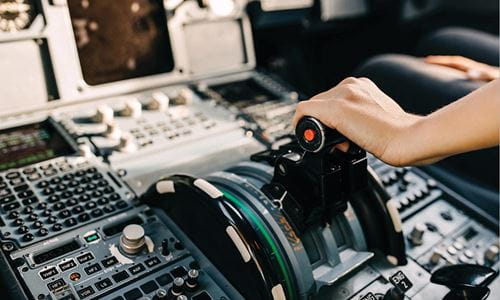
A Support Network Like No Other
ALPA Team Defends Member Against Emergency FAA Action
Editor’s note: This article is one in a series that highlights the unique and difficult challenges airline pilots occasionally confront and the team of subject-matter experts, made up of ALPA pilot volunteers and professional staff, available at a moment’s notice to come to their aid. The union provides a support network like no other, ensuring members—particularly those facing potentially career-ending circumstances—receive the representation, resources, and services they need to keep flying.
Imagine the nightmarish scenario in which federal regulators suddenly declare an emergency and revoke your certificates—for a situation that occurred more than two and a half years ago. While this may sound like a feature film storyline, it recently happened to an ALPA member who’s opted to remain nameless. Despite his anonymity, he understands the importance of sharing his story to help others who may face similar circumstances.
All who came to the pilot’s defense lauded him as an individual of integrity who demonstrates the highest levels of propriety and professionalism. Unfortunately, he fell victim to overzealous FAA officials determined to pursue an unjustifiable case.
Several years ago, the ALPA member arrived in Los Angeles, Calif., following a red-eye flight, and after taking a long nap, went for an extended walk with his flight deck partner. After dinner, recognizing the significant distance to the layover hotel, they decided to rent two electric scooters. Along the way, the pilot lost his balance and fell to the ground while maneuvering his scooter from the sidewalk to the street. Emergency medical responders who examined and treated the pilot for two abrasions gave him the option to visit an emergency room. After a long wait without significant pain, the pilot checked and got confirmation he could leave the waiting room.
The following day, having performed IMSAFE self-examinations the night before and in the morning, he operated a flight during which he had only minor discomfort, which was to be expected. However, on his next and final leg, which was a deadhead, he noted a change in his breathing after lifting his flight bag into an overhead bin.
Upon arriving at his domicile, the pilot spoke to his airline’s duty officer about the Los Angeles incident and his experience on the deadhead. He then proceeded to an emergency room where he eventually learned he had fractured ribs and a punctured lung. Despite three medical professionals examining him, there were no signs of these conditions until precautionary X-rays revealed them.
The ALPA member consulted his aviation medical examiner (AME), who approved his return to flying six months later. After requalification, he flew 162 legs, accumulating more than 860 flight hours, without incident, from March 2023 to March 2025.
On March 10, 2025, the pilot received the FAA emergency order revoking his certificates. The FAA alleged that the pilot had knowingly operated the over-two-and-a-half-year-old Los Angeles flight in a condition that potentially jeopardized safety.
Emergency revocation of an airman’s certificates is effective immediately; a pilot has 48 hours to appeal. If they appeal, a judge from the NTSB’s Office of Administrative Law Judges decides, within five days, if the emergency revocation is justified. The pilot immediately contacted his status rep as well as the union’s Representation Department to get this process rolling.
“You have two calendar days to challenge the emergency revocation, and only 30 days to complete the entire appeal, which makes the case a ‘Rocket Docket,’” remarked Brett Eckelberg, the Association’s senior labor relations counsel. ALPA timely filed the appeal, and the initial judge rejected the emergency revocation on March 17, finding the FAA’s reasoning “specious,” and ordering the agency to immediately return the pilot’s certificates.
From the outset, Eckelberg highlighted two legal bases for dismissal: the stale complaint rule (i.e., too much time had elapsed) and the doctrine of laches, which bars a claim for unreasonable delay and prejudice to the opposing party.
With his certificates returned, the pilot could avoid the Rocket Docket and wait for a regular hearing, which could take a year or more to schedule while he could continue flying. However, he felt strongly he had done nothing wrong and wanted to clear his name. In addition, he noted, “Brett really believed in me. He really came to my side.”
The Association summoned a team that would be integral in helping the pilot overcome the FAA’s accusations. In addition to Eckelberg, the members included Dr. Quay Snyder, ALPA’s aeromedical advisor and president of the Aviation Medicine Advisory Service. He wrote the medical expert report that proved so critical in this case and attended the trial to serve as a medical expert.
“The FAA’s witness had significantly tilted the interpretation of the facts and evidence to support the agency’s position,” said Snyder. “However, the material I reviewed from the time of the incident through the subsequent follow-up to the pilot’s AME clearance indicated that the pilot had done all the things he should have.”
Martha Boden, the union’s labor relations counsel, “helped save the day,” according to Eckelberg, because an overwhelming number of legal documents had to be filed. Eckelberg noted that with the trial set for April 1, they had only 21 days to complete the preliminary requirements for an entire civil case, which typically takes a year or more. “When my supervisor saw what it would take to move the case forward, he immediately reassigned Martha from another project to join in supporting the pilot,” Eckelberg commented. “In the end, Martha was instrumental in drafting the final motion to dismiss and served as cocounsel during the trial. She also played a key role in developing our tactical legal strategy.”
Catrina Paulino, an ALPA paralegal, properly marked the numerous documents and prepared the voluminous trial binders, which the court required and which Eckelberg, Boden, Snyder, and the Association’s litigation team—including Jay Wells, senior attorney, and Nadia McIlhany, senior paralegal—needed to quickly access vital information.
With no court space available on such short notice, Pat Cruz, an ALPA senior office specialist, converted a local master executive council conference room into a facility suitable for use as a federal courtroom. The judge approved the transformation, and Cruz assisted with the required security protocols for the event.
In addition, three other pilots scheduled security, collected evidence, and managed witnesses—securing four affidavits to support the motion to dismiss.
The trial was conducted on April 1–3. Over the first two days, the FAA presented its case and questioned witnesses. The agency’s prosecutor aggressively questioned the ALPA member, but he answered all questions calmly and clearly.
“On the third day, Brett and Martha made a petition to dismiss the case because the FAA action was stale,” remarked Snyder. “The court broke for lunch, and I prepared to give my testimony.” However, he never got the chance.
The judge announced that lunch would be extended. He later returned to the courtroom to read a roughly eight-page decision throwing out the case and the underlying allegations. The judge described the occurrence as a “case of first impression” for the main regulation [14 CFR § 61.53(a)(1)–Prohibition on operations during medical deficiency] underpinning the agency’s claim.
“The work of Brett and Martha set a new precedent that has implications not just for ALPA members, but for pilots across the country,” Snyder asserted.
“Before this decision, the FAA had no deadline to revoke a pilot’s certificates as long as they declared an emergency,” Eckelberg stated. “That unlimited ability to revoke ended here with the judge citing, among other authority, the 2024 amendment to the Pilot’s Bill of Rights that requires the FAA to either take action or close its investigation within two years.” The FAA’s pursuit of this particular case, after such a protracted period, clearly offended due process.
The Rocket Docket, as Eckelberg described it, required an enormous amount of work to be completed in a limited time frame, but ALPA’s defense team rose to the challenge.
“It was one of the highlights of my career to participate in this effort,” observed Snyder. “I came back and told the folks in my office that I had never been more pleased to be a minor part of such a huge case and to see everything that ALPA was willing to bring to the table for an individual pilot.”
The ALPA member expressed his profound relief and gratefulness, saying, “I have tremendous respect, appreciation, and gratitude for everyone who came to my aid. I really feel like I owe them my life.” Most importantly, he’s back on the line and flew his first trip since the emergency revocation on May 21.
This article was originally published in the June 2025 issue of Air Line Pilot.












